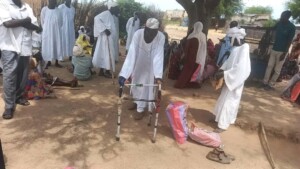Doctors confirm ‘diarrhoea’ outbreak in Sudan is cholera
All reports and symptoms of an outbreak of deadly and acute watery diarrhoea in eastern Sudanese states point to the spread of cholera, according to a Sudanese epidemiology specialist.
All reports and symptoms of an outbreak of deadly and acute watery diarrhoea in eastern Sudanese states point to the spread of cholera, according to a Sudanese epidemiology specialist based in the United Kingdom.
The so-called widespread acute watery diarrhoea in El Gedaref and Red Sea is in fact cholera, UK-based epidemiology and infectious diseases specialist Dr Ezzeldin Gamar told Radio Dabanga on Tuesday.
Dr Gamar declared that he and his colleagues in Sudan “are very convinced that it is cholera,” and not, as reported by federal and state governments, an outbreak of watery diarrhoea across Sudan's eastern Red Sea and El Gedaref states.
The disease has continued to claim lives over the past five months: there have been a number of deaths and the federal Health Ministry has acknowledged the spread of the “watery diarrhoea epidemic” in eastern Sudan and Khartoum. The Ministry reported that last week that 333 people were suffering from the deadly disease in El Gedaref, Red Sea, and Khartoum states, but did not announce clear measures to contain the disease.
Factors
“In any community where infections of acute watery diarrhoea have been reported, there are cases among all age groups. Children, adults, elderly. As typically with cholera there is no high fever among them, usually. Also, some patients suffer from vomiting and stomach cramps. This is a typical scenario of cholera symptoms,” Dr Gamar pointed out.
“Colleagues in Khartoum, El Gedaref, Blue Nile have described the cases to me: the diarrhoea is clear and watery, like water boiled from rice. And it smells like fish. They are very convinced that is cholera.”
The fact that the infection spreads quickly across the communities, including villages, areas or within a house, to sometimes as many as ten cases, is another symptom of a cholera outbreak, Dr Gamar asserts.
“All the factors for cholera to spread are there. There is a complete lack of medicines and clean water, there is poverty, a low level of education, health facilities – especially in rural areas. People cannot buy or find medicines, without fluids against diarrhoea or oral rehydration solution (ORS) available.”
Censored
Dr Gamar speaks of his work in the field of cholera in Sudan. “We were not allowed to write about it in our medical reports. The authorities would hide this kind of diagnosis, even with clear cases.” He says he knows of doctors who were transferred or never hired again, after they reported a diagnosis of cholera.
Cholera is not mentioned by name, but called acute watery diarrhoea in Sudan. “It seems a stigma for the government. However raising the awareness among communities about preventing cholera is crucial to containing a cholera outbreak.” Dr Gamar fears that the current situation will turn into a long-lasting outbreak.
“Medics, nurses: they are the vehicles of information. They won't declare it is cholera but have made a sort of campaign to raise awareness.”
From the UK, the doctor and colleagues in Sudan coordinate activities to raise awareness about cholera among communities, although the outbreak is not officially acknowledged by the states.
“Health professionals, medics, paramedics, and nurses in Sudan are trying this on their own, and there is some sort of social mobilisation and community awareness taking place. But we are not allowed to mention it as cholera. We try to do as much as we can. Precautions against cholera are similar as with diarrhoea: it needs hygiene, protection, and isolation.”
Meanwhile in Khartoum, health authorities announced the start of a campaign to spray against mosquitoes and flies on Sunday, in the wake of the outbreak of the contagious disease in many parts of the capital. The Ministry of Health said that the spraying campaign will continue for 15 days. Hospitals in Khartoum North hospitals have received dozens of people suffering from watery diarrhoea from the Jeili, El Khojalab, and Kabashi suburbs.
Deadly
Press departments of the World Health Organization (WHO), the United Nations High Commissioner for Refugees (UNHCR) and the UN's humanitarian office (OCHA) in Sudan did not yet respond to questions from Radio Dabanga today.
Cholera is caused by ingestion of food or water contaminated with the Vibrio cholera bacterium. It can kill within hours if left untreated. A short incubation period of two hours to five days enhances the potentially explosive pattern of outbreaks. Large outbreaks of cholera have been reported to the WHO in Sudan, Somalia, Yemen, Afghanistan, Djibouti, Iraq, and Pakistan in the last decade.
The latest cholera outbreak in Sudan was reported in the eastern state El Gedaref in 2007. South Sudan reportedly suffered from a cholera outbreak in 2015.











 and then
and then